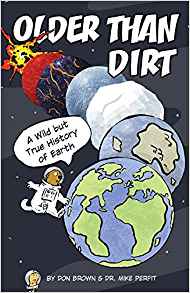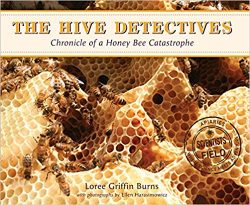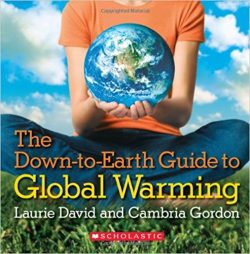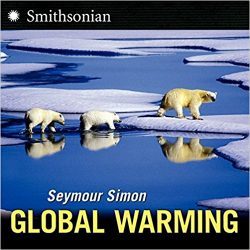Things to think about…
Books:
Almost 14.5 billion years ago, it all started with a BIG BANG and what began as a cloud of gas, dust, and rock eventually took shape and bloomed into a molten sphere. Battered by asteroid collisions, ice ages, and shifting tectonic plates, our fledgling planet finally pushed forth continents. But if you think the earth has calmed down since then—think again! Geological activity continues to sculpt the earth’s landscape, sometimes with terrible consequences for its inhabitants: earthquakes, volcanoes, and tsunamis.
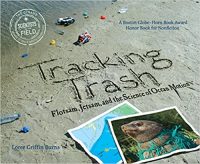
Aided by an army of beachcombers, oceanographer Dr. Curtis Ebbesmeyer tracks trash in the name of science. From sneakers to hockey gloves, Curt monitors the watery fate of human-made cargo that has spilled into the ocean. The information he collects is much more than casual news; it is important scientific data. And with careful analysis, Curt, along with a community of scientists, friends, and beachcombers alike, is using his data to understand and protect our ocean.
In engaging text and unforgettable images, readers meet the woman who started it all (Curt’s mother!), the computer program that makes sense of his data (nicknamed OSCURS), and several scientists, both on land and on the sea, who are using Curt’s discoveries to preserve delicate marine habitats and protect the creatures who live in them. A Boston Globe-Horn Book Award Honor Book for Nonfiction.
Eye of the Storm: NASA, Drones, and the Race to Crack the Hurricane Code
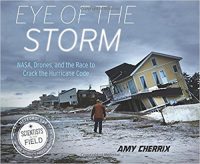
Ten million Americans live in hurricane danger zones, but how do we know if or when to evacuate? We must predict both when a storm will strike and how strong it will be. A daring NASA earth science mission may have finally found a way to crack this hurricane code.
Dr. Scott Braun is the principal investigator for the Hurricane and Severe Storm Sentinel mission (HS3), which flies repurposed military drone over hurricanes so that scientists can gather data. But the stakes are high and time is running out.
In the first Scientists in the Field book entirely about weather, meet the NASA team on the cutting edge of meteorological field science.
It’s getting Hot in Here: The Past, Present, and Future of Climate Change
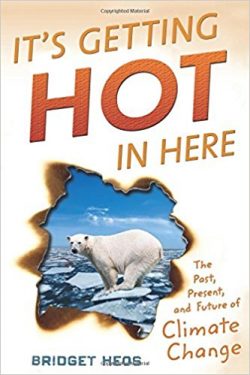
Tackling the issue of global warming head-on for a teen audience, Bridget Heos examines the science behind it, the history of climate change on our planet, and the ways in which humans have affected the current crisis we face. It’s Getting Hot in Here illustrates how interconnected we are not just with everyone else on the planet, but with the people who came before us and the ones who will inherit the planet after us. This eye-opening approach to one of today’s most pressing issues focuses on the past human influences, the current state of affairs, the grim picture for the future—and how young readers can help to make a positive change.
The Hive Detectives: Chronicle of a Honey Bee Catastrophe
Without honey bees, the world would be a different place. There would be no honey, no beeswax for candles, and, worst of all, barely a fruit, nut, or vegetable to eat. So imagine the beekeeper Dave Hackenburg’s horror when he discovered twenty million of his charges had vanished. In The Hive Detectives, Loree Griffin Burns profiles bee wranglers and bee scientists who have been working to understand colony collapse disorder, or CCD. In this dramatic and enlightening story, readers explore the lives of the fuzzy, buzzy insects and learn what might happen to us if they were gone.
The Down to Earth Guide to Global Warming
Irreverent and entertaining, DOWN TO EARTH is filled with fact about global warming and its disastrous consequences, loads of photos and illustrations, as well as suggestions for how kids can help combat global warming in their homes, schools, and communities. Engagingly designed, DOWN TO EARTH will educate and empower, leaving readers with the knowledge they need to understand this problem and a sense of hope to inspire them into action.
Award-winning science writer Seymour Simon gives you a full-color photographic introduction to the causes and effects of global warming and climate change.
Earth’s climate has always varied, but it is now changing more rapidly than at any other time in recent centuries. The climate is very complex, and many factors play important roles in determining how it changes. Why is the climate changing? Could Earth be getting warmer by itself? Are people doing things that make the climate warmer?
Videos:
Climate Change 101 With Bill Nye
Neil deGrasse Tyson Explains The Real Problem With Climate Skeptics
Sea Levels On The Move/Smithsonian
What If All The Ice on Earth Melted/Bill Nye
Greenhouse Gases and Global Warming
A Changing Environment-Snow, Water, Ice and Permafrost in the Arctic
Climate Change: What Happens if the World Warms Up by 5 Degrees C?
Articles:
Antarctica Has Lost Nearly 3 Trillion Tons of Ice Since 1992
Ocean’s Circulation Hasn’t Been This Sluggish in a 1000 years
The California Fires and Global Warming
One of the Clearest Signs of Climate Change…
Climate Change May Spell Hotter summers for Southern Europe
We Charted Arctic Sea Ice for Nearly Every Day Since 1979
More Hot Day Are Coming With Climate Change
Earth Sweltered to Third Hottest August, Summer on Record
What Climate Scientists Want You to See in the Floodwaters
Climate Change Seen As Cause of Mudslide in Switzerland
The Relationship Between Hurricanes and Climate Change
Alaska’s Permafrost is Thawing
Evidence of Climate Change Abounds Amid Extreme Weather in the Pacific Northwest
Climate Change Has Shifted the Timing of European Floods
Chile’s Energy Transformation Is Powered by Wind, Sun, an Volcanoes
What If All The Ice Melted on Earth?
Earth To Warm 2 Degrees By End of Century
Seven Things To Know About Climate Change
It’s Not Your Imagination. Summers Are Getting Hotter
Miles Of Ice Collapsing Into The Sea
2017 Is So Far the Second Hottest Year On Record Thanks To Global Warming
A Massive Chunk Of Antarctica Just Broke Off
Five Climate Change Lessons From Stephan Hawkins
Climate Change Is Already Reducing Flows In the Colorado River
Government Sites, Academia & Such
Note: The Trump Administration is scrubbing many government websites of climate change information, making these site unreliable sources of information.
Historically Hottest Summers to be the Norm
Archived EPA Site (Non-governmental)
National Oceanic and Atmospheric Adminstration
National Centers for Environmental Information
U.S Global Change Research Program Climate Science Special Report
Smithsonian National Museum of Natural History
Department of Ecology, State of Washington
Recent Intense Hurricane Response to Global Climate Change
The Increasing Intensity of the Strongest Tropical Cyclones
Intergovernmental Panel on Climate Change
NOAA: Global And Regional Sea Level Rise Scenarios For the United States
